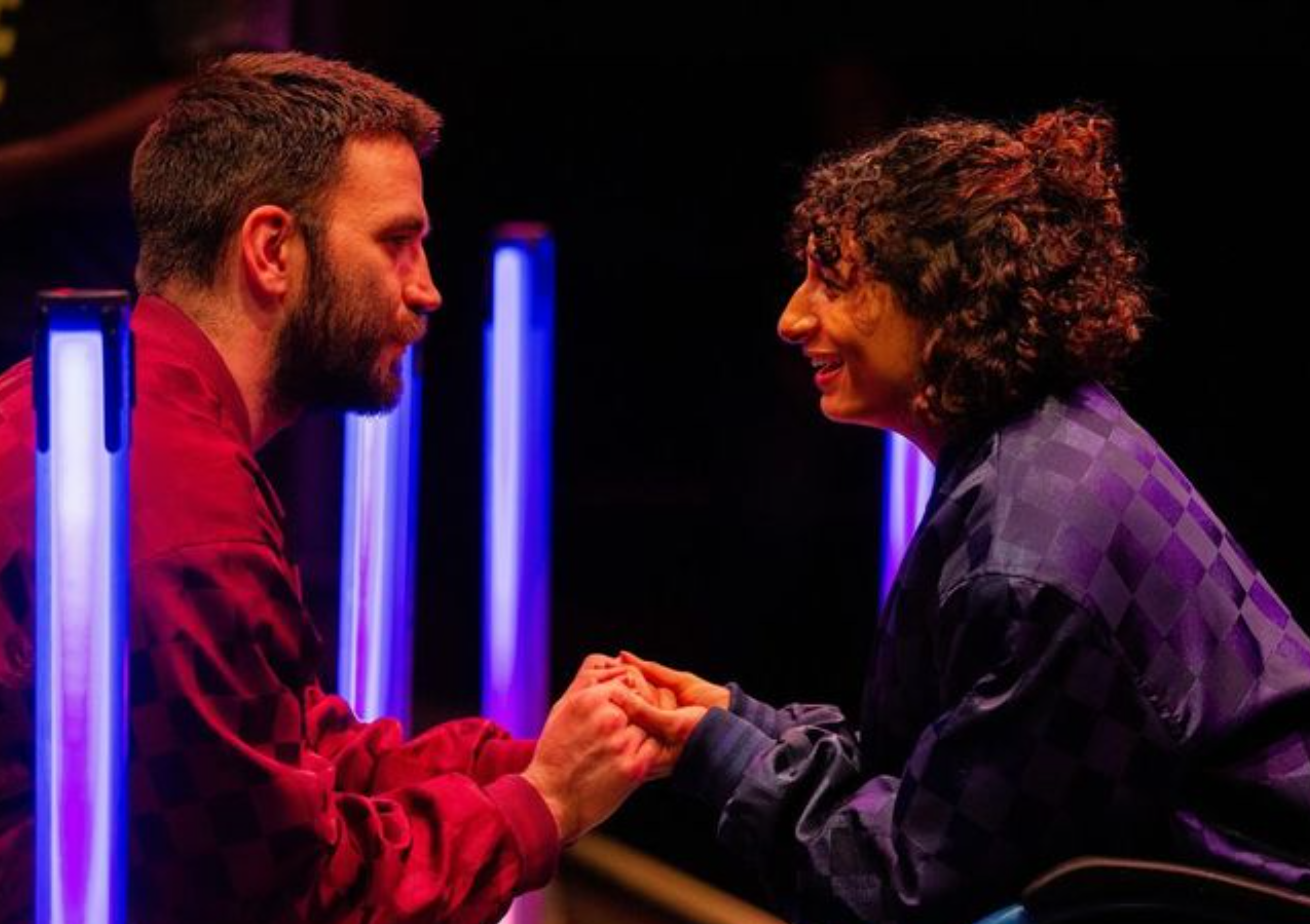This Diverse Cast Gives Shakespeare’s Love-Tragedy a Vibrant, Funny Retelling

Romeo and Juliet | Shakespeare North Playhouse | September 16th – October 5th
Reviewed by Joseph Hunter
A group of extras gather in a waiting room, to be summoned by an impersonal, dystopian PA system when it’s time for them to deliver a single line to camera. A screen test for a small, walk-on part, but they’re all used to that. Same old bit parts – until, that is, a script literally drops from the sky and lands in their midst. It’s Romeo and Juliet. They decide to perform it together. Why not?
This is the framing device in Graeae’s production of Romeo and Juliet at the Shakespeare North playhouse, directed by Jenny Sealey. Although ‘device’ does the idea a disservice. It’s a thorough reimagining of the play, and features a cast of deaf, disabled, and neurodivergent actors. These diverse attributes are inherently part of the production. BSL interpreters (Petre Dobre, Craig Painting, and Irmina St Catherine) sign the spoken dialogue throughout, as actors playing the scenes in mirror image. Screens around the stage display captions for what is happening onstage, not just the dialogue but much of the action, both in words and in witty animations, as well as various kinds of creative shorthand. (For example, one mass outburst of excitement from the cast is captioned simply as ‘ALL: OMG’.) To add to all this exuberance the cast continually interrogate and renegotiate the play between scenes, swapping roles, props, and even doubling up.
If all this sounds a little confusing, it is – for the first five minutes, perhaps. After that, everything flows. The Shakespeare North Playhouse’s Cockpit Theatre is seated in the round, and so I felt less like an audience member than I did part of the cast’s energetic dynamic. It all just works: you soon find yourself switching your attention back and forth with pleasure between the Romeo and Juliet who are speaking the lines out loud and the pair performing the scene alongside them in sign language, with the four sometimes intertwining.
There are wonderful performances. Shreya M Patel plays Lady Capulet from a wheelchair with haughtiness and flamboyance – and later, when she switches to Juliet, is commanding and earnest in equal measure. Ciaran Forrest, as Romeo, delivers teenage petulance early in the play and then high passion later. Reece Pantry is a delight in both of his primary roles, particularly as a camp, Yorkshire-accented, pink-bomber-jacketed Mercutio who rolls around the stage winking at the crowd. A special mention, too, for Kellan Frankland’s gutsy and funny interpretation of Juliet’s Nurse, particularly during her defiance of the sassy Mercutio, raising her middle finger at his retreating wheelchair.
I had always thought that there were basically two ways of doing a production of Romeo and Juliet. You could focus on the romantic aspect, the love-at-first-sight-til-death-do-us-very-soon-part stuff. Or you could emphasise the waste and pity of it all, the pointless bloodshed, the young death, and the violence. This production instead focusses primarily on the comedic aspects of the play, a decision amplified by the humour and self-knowing nature of the commentary between scenes. That’s not to say that there aren’t moving moments. There is genuine-seeming friendship on display, and the titular pair of lovers’ tender moments are suitably tender. In fact, perhaps the highlight of the night for me was one such tender – and unexpected – moment, when Romeo is told of Juliet’s death and the first to speak in reaction is not Forrest but Petre Dobre, who is the primary sign language Romeo. Having not vocalised a sound out loud up to this point Dobre cries Romeo’s ‘No, no, no’ with incredible texture and agony.
The scenes are sketched out with the use of several poles that glow a range of colours, evoking different moods. During the mortal fight between Tybalt and Mercutio, for example, soft pink and blue lighting crossfades into harsh red and blue. Fairy lights, two wheelchairs, a pink water bottle, and a few benches complete the minimal set-dressing – and this is more than enough, deployed with skill by a cast whose energy fills the space with more left over.
After Romeo and Juliet’s double suicide the cast gathers en masse for a final debrief, and shared reading of the epilogue. Backs are slapped, smiles are shared. Then the disembodied voice on the PA calls them for their mass audition. They decide they won’t bother. They’re ‘done being on the side lines’. From the shadows, where I was sitting on my Cockpit Theatre bench, they looked very comfortable occupying centre stage.
Romeo and Juliet at the Shakespeare North Playhouse runs until the 5th October.
Reviewed by Joseph Hunter
